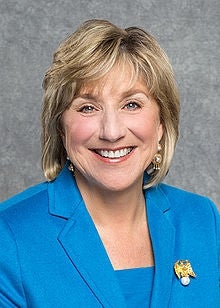The Senate overruled the recommendations of its most powerful chairwoman Thursday night on its way towards passing strict restrictions on non-compete contracts.
During debate, Senate Ways and Means Chairwoman Karen Spilka told her colleagues she could not support the bill put together by Rules Committee Chairman Mark Montigny and others.
Senators who supported the legislation said the Senate’s version of non-compete legislation severely limits employers’ ability to bar employees from working for a competitor. Senators pointed to the powerful tech sector in California, where non-compete agreements are banned outright, and said by freeing workers’ ability to move around, the state could foster a better environment for innovation.
Montigny said the bill’s drafters “err on the side of protecting the worker,” determining the agreements must last only three months and include full salary to the departing worker – a feature known as a “garden leave” clause.
The House version of non-compete legislation, which was passed unanimously in June, limits non-compete agreements to a year, and provides for “garden leave” provisions where employees are paid half their salary or “other mutually-agreed upon consideration.”
Describing how she had spoken to employers with varying points of view, Spilka sought to alter the legislation.
“I was hoping to vote yes on the non-competes bill today. Unfortunately, as presented to us, I cannot do that,” the Ashland Democrat said. “The amendments I have proposed on this bill reflect what I believe is a common-sense approach to non-competes.”
Spilka proposed extending the length of non-competes to one year and allowing judges to alter the agreements to make them valid.
Spilka said she agreed it is “absurd” for non-competition clauses to apply to camp counselors and other low-wage workers, but she said she favored more flexibility in the bill. Spilka noted she is the founder of the Tech Hub caucus and said her Metrowest district is an economic engine.
Without debate the Senate rejected all four of Spilka’s amendments along with two others.
Montigny, a New Bedford Democrat, was dismissive of arguments he said he had heard from opponents who sent correspondence.
“It was actually sad if not pathetic to see some of the arguments,” Montigny said at the start of debate. He also said, “I hope we reject most of the amendments.”
The full Senate’s opinion on the bill was not taken by a recorded vote. Although Sen. Jason Lewis, a Winchester Democrat, began to ask for a roll call on the bill, he later withdrew his request and the bill was passed on a voice vote.
Sen. William Brownsberger, a Belmont Democrat, said the bill prohibits non-compete agreements for those with limited income and continues to allow companies to bar former employees from taking clients or trade secrets.
Both the House and Senate adopt the Uniform Trade Secrets Act in their non-compete bills.
The Senate bill requires courts to reject non-competes found to be overreaching rather than rewriting them, according to Brownsberger, who said that provision would encourage corporate counsel to structure more narrowly focused agreements.
The bills (H 4434/S 2418) appear headed for a six-member conference committee. House Speaker Robert DeLeo has said the House bill represented a carefully crafted compromise based on extensive talks.

